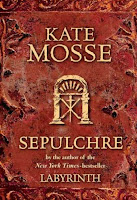It turns out that doing two uni modules at the same time is quite
time consuming. Even when I'm not actually working on it, my mind is
forever asking me DIFFICULT questions about golgi apparatus and the
finer details of Galenic theory. However, in the last week, I've been
rather unwell and spent a lot of it reading. So, a triple bill of
reviews.
Author: Mark Mason
Year published:2011
Pages: 368
Time It Took To Read: About a week
First up, Walk The Lines. A man decides to walk all the main London lines (not the DLR or overground), to get a better sense of London. I read this after visiting my dearest friend Katie, who lives in Hammersmith, as I am perpetually confused when leaving the tube station there trying to find her house. She lives NEXT TO THE THAMES, yet I can never bloody find it. I, like many other fen-dwelling country folk, have no idea how London actually fits together on the surface. It took me several years before I realised that Leicester Square and Covent Garden are next to each other. Such is the curious geography of the tube, which makes everywhere seem oddly divorced from its neighbours.
Mark Mason has lived in London most of his life, but now lives in Suffolk where life is cheaper, and a one bedroom flat rent in London can get you a small mansion. It turns out that walking the lines equates to about 400 miles. He does it by line, rather than simply wandering from station to station, meaning he visits a lot of stations twice.
I enjoyed the book, from a nerdy point of view, but I felt it could have included more trivia. It feels like the extended, occasionally drunk, grumble of a man who's doing a lot of walking. If Tim Moore had done the same thing, it would have been wondrous. It's still a good read though, especially if you enjoy the Tube network.
Author: Alison Weir
Year published:2007
Pages: 278
Time It Took To Read: Two days
I've
reviewed Alison Weir's historical fiction before, but this is the first time in a long time I've read one of her histories. The last one I read was Mary, Queen of Scots, which was bloody ponderous. However, this was a pleasant surprise.
As you might expect, a 14th century woman who was very much on the fringe of importance until the latter years of her life does not leave the biggest archive of material to base a biography on. Kathryn Swynford was the notorious mistress, and later wife of John of Gaunt, Duke of Leicester, one of the primary nobles of the 14th century. His brother, Edward III, was one of the finest rulers England ever had, and John of Gaunt's son by his first wife became Henry IV. Kathryn Swynford bore him four bastard children, who were later legitimised by papal decree (and then illegitimised by Richard III, trying to protect the throne from Henry Tudor, ignoring his own descendancy from them), and her descendants include all monarchs since the 15th century, and many other important figures. Alison Weir weaves a story around her, based mainly on property deeds and the records of John of Gaunt, and most of her source material is educated guesswork based on the much more complete records of his doings. I found it particularly interesting because, like so much of the royal court at that time, the places she lived are not far from me. Peterborough, Stamford, King's Lynn, Grantham, Lincoln and Boston were all Lancastrian lands back then, and regularly referenced.
This is the first time I've read much biography about the Plantagenet family, and I really enjoyed it. Kathryn Swynford is an excellent example of a woman either ignoring or largely escaping the misogynist taint of adultery in those days, owning property in her own right and raising illegitimate children without much apparent backlash. It helped that she was within John of Gaunt's household for the majority of those years, but she's still a rarity. It's a well written, well sourced book, and worth a read if you're interested in that era.
Author: Maj Sjöwall and PerWahlöö
Translator: Joan Tate
Series: Martin Beck, book 5
Year published: 1969 in Swedish, 2011 in English
Pages: 288
Time It Took To Read: A day
Do you know what I like? Hotel rooms that give you books to read! I went away last weekend, and in my hotel room was this (and some godawful chicklit), so I devoured it promptly. Martin Beck is the original grumpy Swedish detective, and there are a total of ten books about him, written by a married couple.
In this story, a house blows up in the middle of the night, and when it's discovered to be arson, the hunt is on for the killer and the motive. This is a realistic police procedural book, that doesn't mess around with endless heartfelt plot. The characters are realistic: they go home, they have wives, they drink, they screw, they sleep. Martin Beck is the head of the homicide department, with a crap homelife, but unlike similar British detectives *cough,Frost,cough*, he doesn't sleep in his office or apparently shout at his wife. He just gets on with it, drily.
I loved this. It wasn't painful to read like the Millennium Trilogy (excellent, but god you need therapy afterwards), or gorily foul like Wallander can be, but it was incisive, with true characterisation and I really cared about the resolution. And unlike many other books, where the perpetrator is immediately obvious after the prologue, I really didn't know whodunnit til the very end.
I've got the Harry Hole series lined up next...
Book count: 47/50


























